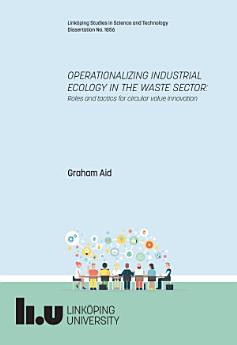Operationalizing Industrial Ecology in the Waste Sector: Roles and tactics for circular value innovation
About this ebook
The aim of this thesis is to contribute to the development of knowledge and understanding of how the waste management sector can operationalize more effective and efficient resource management. In approaching this aim, two research questions guided the exploration of: 1) novel roles for WM and 2) support tactics for such roles. Grounded in the broader context of Industrial Ecology (IE) and Business Development, five studies were performed. Two studies, focused on the novel roles of inter-organizational resource management and high value secondary resource extraction, were performed through literature review and interviews, and market driver analysis respectively. In exploring support tactics, two design and proof of concept studies were carried out to investigate data analysis tools for inter-organizational resource management, and one long-term action research engagement project was coordinated to study hands-on inter-organizational collaboration tactics.
The studies highlighted that the Swedish WM sector holds some key capacities for operationalizing (and in some cases, is already developing) the novel resource management roles identified: industrial symbiosis facilitator, eco-industrial park manager, holistic facility management, and high value resource extractor. However, depending on the portfolio of services to be performed in such roles, several capacities may need to be developed or strengthened. Main opportunities seen for these roles were – staying ahead of market developments, and aligning activities with organizational goals. The main general risk related to these roles was insufficient returns on investment. Looking forward, the main enablers identified were policy leadership for more balanced market mechanisms, increasing use of external knowledge, developing long term partnerships, lobbying, stockpiling resources, and carefully crafting new business models.
The tools developed for strategically applying external information toward the identification of opportunities within new roles showed tactical potential. However, their implementation in broader development processes has yet to be fully validated. The hands-on exploration of change oriented collaboration, highlighted collective system framing and goal setting and face-to-face interaction as key activities for inter-organizational approaches within roles such as industrial symbiosis facilitator.
Throughout the studies, several novel roles were investigated. Each of these roles will need to be individually evaluated by directing bodies of WM organizations, and evaluated from the organization’s vision and strategy. If certain roles are chosen to be explored in more detail, they will need to be developed within full business models - addressing issues such as income structure, internal processes and capacities to be developed, and key customers. Through applying IE and business development concepts and findings, WM organizations have possibilities to translate ambitious visions into novel offerings.







